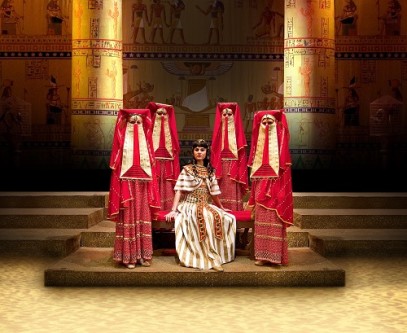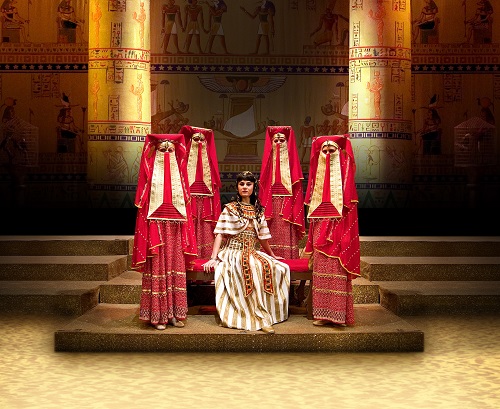 United Kingdom Verdi, Aida: Soloists and cast of Chisinau National Opera, Members of the Orchestra of the National Opera & Ballet Theatre of Moldova ‘Maria Biesu’ and National Philharmonic of Moldova ‘Serghei Lunchevici’ / Vasyl Vasylenko (conductor), Grand Theatre, Blackpool, 10.11.2016. (MC)
United Kingdom Verdi, Aida: Soloists and cast of Chisinau National Opera, Members of the Orchestra of the National Opera & Ballet Theatre of Moldova ‘Maria Biesu’ and National Philharmonic of Moldova ‘Serghei Lunchevici’ / Vasyl Vasylenko (conductor), Grand Theatre, Blackpool, 10.11.2016. (MC)

Cast:
Aida – Ecaterina Danu
Radamès – Giorgi Meladze
Amneris – Liza Kadelnik
Amonasro – Iurie Gisca
Ramfis – Vadym Chernihovskyi
King of Egypt – Oleksandr Forkushak
Messenger – Gicu Barbanoi
High Priestess – Olga Rusnac
Production:
Direction – Ellen Kent
Lighting – Valeriu Cucarschi
Production manager – Neil Morton
Chorus master – Victor Donos
It’s always pleasing to welcome Ellen Kent productions back to the striking surroundings of the Grand Theatre, Blackpool and tonight it was for a staging of Verdi’s Aida an opera with an enduring popularity that shows little sign of relenting.
It’s a common myth that it was written to celebrate the opening of the Suez Canal as it was commissioned by the Khedive of Egypt to mark the opening of the Khedivial Opera House, Cairo. Although Aida was premièred at Cairo in 1871 the first time Verdi himself saw a production of his opera was just over a month later at Teatro alla Scala, in Milan. Set in Ancient Egypt at the time of the Pharaohs Aida is about envy, love, betrayal and patriotism. Verdi didn’t know anything about Egyptian history and what we hear is the composer’s own invention of Egyptian music.
Over the years Aida has had some luxuriant stagings on big budgets. I am thinking in particular of the film of Franco Zeffirelli’s historic 1963 production but those days are now long gone. What we had in Blackpool was a traditional vision from Ellen Kent, an astutely designed and brightly lit staging which looks reasonably lavish by today’s standards. On the Grand Theatre stage the production felt ideally intimate and immediately conveyed a lucid depiction of Ancient Egypt. Most of the action took place in the King’s Palace and Temple of Isis, halls constructed with a geometrically shaped concept of stone block pillars and walls. Especially stunning were the four large statues on plinths of Anubis the Jackal headed Egyptian God each carrying a spear. Easily recognisable Ancient Egyptian hieroglyphic symbols were employed convincingly throughout. Splendidly detailed and colourful the magnificent costumes of the whole cast upheld the values of the traditional staging from the time of the Egyptian Pharaohs. Successfully standing out as intended were the several glorious robes with gold trims worn by Princess Amneris while raven haired slave Aida wore a stunning long sleeveless dress in a mix of brown and burnt orange.
Soprano Ecaterina Danu in the title role of the Ethiopian Princess, captured as a slave, sang her big arias Ritorna vincitor! and O patria Mia capably with reasonable assurance and improved as the evening went on. Danu has a bright voice that travels through the house well, although at times it can be unruly. I have seen more emotionally charged performances in the title role, but Danu acts competently in a rather understated way. The treasurable role of Radamès has attracted heart-throb tenors of the calibre of Jonas Kaufmann and Roberto Alagna in recent years. Here Giorgi Meladze took the part of the love struck Egyptian army captain who is given one of the most famous of all arias, Celeste Aida which appears early in the opera. If rather lacking polish and some subtlety the Spanish tenor coped well, giving a moving portrayal which was full of sincerity and commitment. Liza Kadelnik sang the part of dangerous Princess Amneris the daughter of the Egyptian King. The Ukrainian mezzo gave her challenging aria L’abborrita rivale a me sfuggia a fine performance but her voice didn’t carry too well through the house and additional focus is needed to avoid unsteadiness. I was never totally convinced that Kadelnik was fully engaged in the role however her duet with Radamès L’aborrita rivale… Già i sacerdoti adunansi generated good emotional drama.
Iurie Gisca stole the show with his mightily impressive performance as Amonasro, King of Ethiopia. Together with his committed and assured acting Gisca displayed his rich velvety baritone voice which is impressively clear and just oozed character and emotional expression. Bass Vadym Chernihovskyi as the High Priest Ramfis revealed a lovely deep voice with clear diction that projected well to all corners of the house. There were similarly positive attributes too from bass-baritone Oleksandr Forkushak who did all that was asked of him as the King of Egypt. Praise is due to Vasyl Vasylenko for directing his twenty-eight strong Moldova orchestra with an unremittingly clear beat. A few intonation issues mainly from strings gradually ironed themselves out as the opera progressed. In Aida’s aria O patria mia the supple solo oboe accompaniment was top drawer. Standing out was the quality of the male dominated chorus for its striking sound and satisfying unity. At curtain down at the Grand Theatre I can’t imagine any member of the audience feeling anything other than entertained by Ellen Kent’s Aida.
Looking at the Ellen Kent, UK and Ireland tour programme for Spring 2017 I’m surprised to see La bohème, Aida and Nabucco being wheeled out again. Surely it’s time to freshen up the repertoire?
Michael Cookson
For details of the current tour of Aida and the other operas please see www.ellenkent.com.
